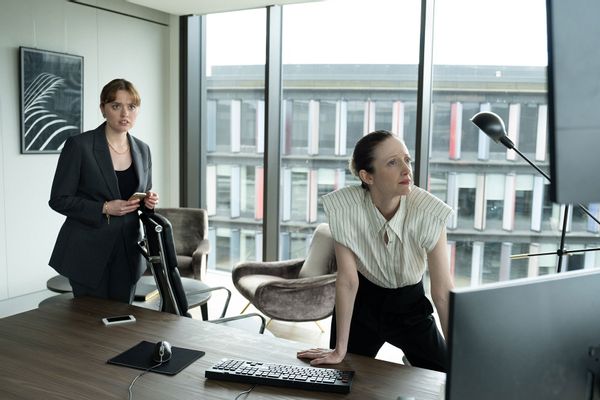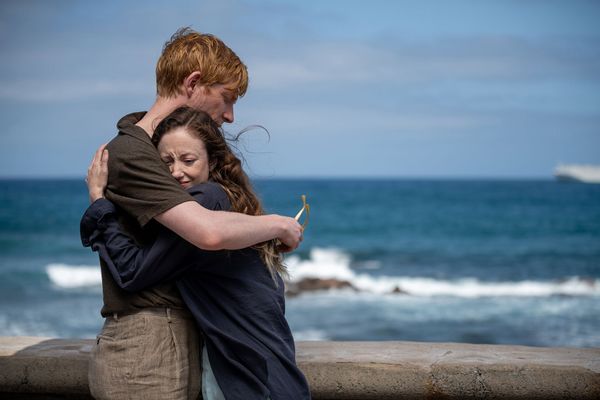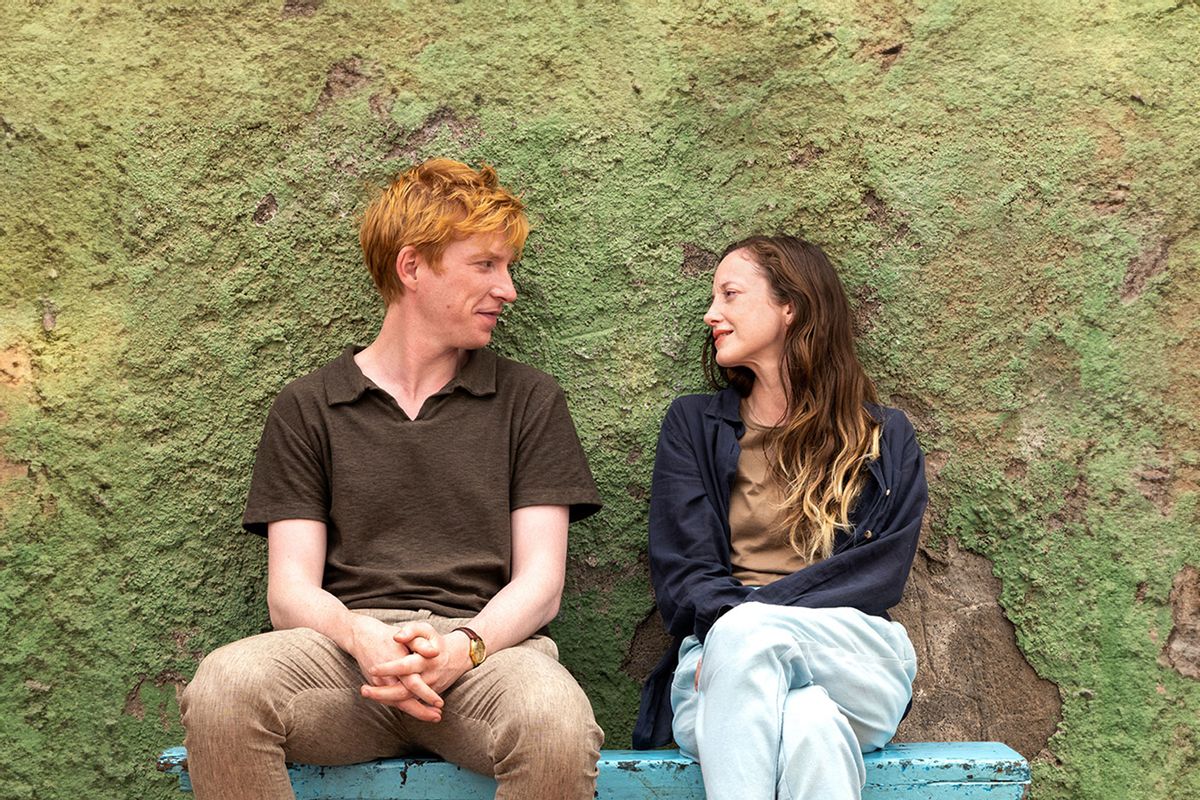Andrea Riseborough would be the first to tell you that she’s too trusting. “You know, just the other day I got scammed,” she told me last month in Pasadena. It was her bank account. Oof. How did it happen? “I was having a very nice conversation with a very nice person on the phone,” she said. “I’m very trusting.”
The Oscar-nominated “Alice & Jack” star laughed as she related this anecdote, an unexpected response to a question about whether she would give her character as many chances as Domhnall Gleeson’s Jack does.
Alice is what a polite person would describe as difficult. That much is clear a few words into the usual first date small talk. He answers the opener of, “What do you do?“ by explaining that he’s researching a rare disease to find a cure.
In another TV romance, Alice would feign fascination, try to seem engaged but polite if she weren’t interested, or flirt if she were.
Instead, she asks, “Why?” As in, what’s in it for him if he eradicates this malady? His answer, that he'll be satisfied to have helped people, yields more questions that draw him down a path of cool but curious logic. But there's something fetching about her. He is an honest, generous person. She is mercenary and works in finance. A clear reward calculus, she says, as opposed to his murky math.
They spend the night together, and in the morning she gives him the boot. He sweetly offers to call. “Thank you, but if it’s OK with you, I’d rather you didn’t,” she replies. That should have been the end. Instead they become magnets, attracting and repelling over a decade and a half. Alice is a change catalyst for Jack, both wonderful and disastrous.
So, I ask, would she date her character? “Yes. I can say that without any hesitation, really,” said Riseborough. “I love spicy people. I’m not the poster child for common sense where romance is concerned.”
 Aimee Lou Wood as Maya and Andrea Riseborough as Alice in "Alice and Jack" (Fremantle/PBS)“Alice & Jack” is a divergence from other “Masterpiece’” series, which is probably due to Victor Levin’s sensibilities. An American whose TV writing credits include “Mad Men” and “Mad About You,” titles that are as tonally disparate as they come, Levin always envisioned Riseborough and Gleeson in these roles, although originally it was set in New York instead of London.
Aimee Lou Wood as Maya and Andrea Riseborough as Alice in "Alice and Jack" (Fremantle/PBS)“Alice & Jack” is a divergence from other “Masterpiece’” series, which is probably due to Victor Levin’s sensibilities. An American whose TV writing credits include “Mad Men” and “Mad About You,” titles that are as tonally disparate as they come, Levin always envisioned Riseborough and Gleeson in these roles, although originally it was set in New York instead of London.
But his honest study of modern romance and the accompanying altered expectations could have taken place anywhere, which is the beauty of it. For people the world over, finding true love is complicated and doesn’t resemble the trajectory that rom-coms and fairy tales sell us.
”Love can look like so many things. And for so many of us, it's not functional,” Riseborough said. “I mean, that doesn't lessen the draw toward each other, the desire for each other, the validity of how you appreciate another person even in spite of your best thinking.”
We need your help to stay independent
Alice also has a deep wound that gave the actor's performance purpose. If Alice seems walled off, there’s a good reason that Riseborough believes should merit grace with the audience. “That doesn't make them any less deserving of love, even if they are absolutely incapable of intimacy in a way that looks functional or healthy on the outside,” she sustained, even as she admits that her past makes her complicated.
“It gives her a firewall or like an armor of candor, and wit and sometimes meanness,” she said. “But I think those things are all to cover hopelessness until she meets Jack. For both, there’s something in the other that needs to be nurtured. And it's hard to explain that to those who love you, especially when it's torturous.”
"I’m not the poster child for common sense where romance is concerned,” Riseborough said.
“Alice & Jack” debuts as Riseborough is appearing in HBO’s “The Regime” as Agnes, the loyal and unappreciated house manager to a dictator played by Kate Winslet. Next to that character, Alice is a kaleidoscope of aspiration and achievement – she’s wealthy, functionally untethered to obligation and, at least at first, unwilling to compromise with anything, even if it would mean sparing someone’s feelings.
“It's really a turning point for Alice when she meets Jack, I think. That's really when life begins. He is faith and hope and goodness to her. And he's probably the first thing she believes in,” she says.
 Domhnall Gleeson as Jack and Andrea Riseborough as Alice in "Alice and Jack" (Fremantle/PBS)So what does this say about modern love? The headlines, after all, are not so optimistic. “Why the growing gulf between young men and women?” The Economist asked last week. A few days before that, The Independent ran a story about South Korea’s 40% plummet in marriage rates over the last 10 years.
Domhnall Gleeson as Jack and Andrea Riseborough as Alice in "Alice and Jack" (Fremantle/PBS)So what does this say about modern love? The headlines, after all, are not so optimistic. “Why the growing gulf between young men and women?” The Economist asked last week. A few days before that, The Independent ran a story about South Korea’s 40% plummet in marriage rates over the last 10 years.
The Washington Post’s editorial board warned that American marriage may be on the verge of collapse. A New York Times essay replied, "Ask Women What Dating Is Like." Then there's the Reesa Teesa of it all.
Want a daily wrap-up of all the news and commentary Salon has to offer? Subscribe to our morning newsletter, Crash Course.
Where does “Alice & Jack” land on this spectrum? Should we look at their rocky climb as a singular tale or an indicator that a realignment of expectations is in order?
“Perhaps it's all about perspective,” Riseborough says in answer to that question.
Then she pauses. “Strangely, as advanced as we think we are sometimes, how funny it is that really only now are people being very open and really honest about what they need and want in a relationship, what they can and can't handle?”
To Riseborough, this love story is as current as it is old. Epic loves like the one explored in “Alice & Jack” always existed, she said. “It's just that they were contextualized differently, and everybody was still perhaps ticking the boxes that were expected of them in terms of marriage or children. That didn't mean that those loves weren't happening all over the place.
"And that sort of epic quality of soul connection is something that I think we don't see a lot on screen,” she continued. “The protagonists so often are just so morally impossibly perfect that it's difficult to fully identify with them. At the same time, I understand why we've made these expectations for ourselves emotionally because it's really important to have hope that love prevails, that there's a happy ending.
“But I am a hopeless romantic and I’ll believe anything,” she concluded. “I'm so willing to trust, often to my own detriment.”
"Alice & Jack" premieres Sunday, March 17 at 10 p.m. on PBS member stations. Check your local listings.



Shares